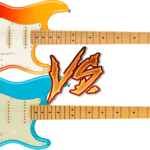With gigs left and right, always hustling and long nights, it seems like professional musicians would never have the time to practice.
This is a common topic among beginning to intermediate musicians, the time we spend with our instruments on a daily basis.
What sort of things will get us as musicians to the next level? How can we grow and become like the pros?
On average, professional musicians play music for around 4 to 8 hours a day, which includes both practicing and performing! Playing every day is not only essential for growth as a musician but also to continuously keep your chops up and your playing consistent. Practice makes consistency.
Again, what serious practice achieves is that your bad days will be as good as an amateur’s best.
Performing is a game of averages, professionals maintain their execution on a higher average level than casuals with practice.
It’s important to remember not to burn yourself out though and use your time wisely.
Though a pro might play 8 hours a day, those hours can be meticulously broken up into different areas of practice such as fundamentals, ear training, transcriptions, solos, writing, and playing with others!
Doing a wide variety of these things in your daily practice will not only make you a more rounded player but a wiser musician with a vast tool belt of knowledge!
Can professionals play a show without rehearsing?
Surely, often as a professional musician, you may show up to the gig, sight-read entirely new music, and be expected to make little to no mistakes!
This skill of being able to sit in on something new comes from years of practice and dedication to the craft.
Though a pro musician might not have the music to practice beforehand, the skills they’ve worked on in and out of the practice room, prepare them for situations like this.
On the contrary, I know from personal experience that for any gig that I’ve had music to look over beforehand, I always try to find the trickiest passages and have them ready to go before the show.
Is rehearsing the same as practicing?
Not exactly.
Rehearsing usually involves getting together with a group of musicians or in an ensemble with a director, and playing through the music that you were expected to practice since the last meeting.
When I come into a rehearsal, I’m expected to already have practiced my pieces, fixed any errors, and be ready to proceed as working on the bigger picture of the music with the group, not as an individual.
In a rock band setting, that means working on your parts at home that you might be having trouble with so you don’t have to waste the rest of the band’s time ( and in many cases money for the practice space) working through personal mistakes.
How many hours a day do professional musicians practice?
On average somewhere between 4 and 8 hours per day, but everyone has a different regiment.
Personally, I make it a goal to get 2 solid hours of practice per day, which involves warming up, fundamentals, scales, and improvisation then working on things like songs and transcriptions.
In most cases, professionals are trying to maintain their level and keep everything consistent!
How many hours a day should you practice to become a professional?
Again, this is different for everyone.
The last thing you want to do is burn yourself out from playing because that is a sad and frustrating process that might ruin music for you altogether.
At first, set modest goals 30 minutes to 1 hour, then slowly add more as your schedule fits.
Even with that amount of time, huge strides in your playing will start to appear.
If you are noticing 1-2 hours isn’t enough, keep adding and keep working until you find the right amount for you!
The way professionals practice makes the difference
End of the day it is not about what you practice, it’s about HOW you practice.
Practice important things like scales and harmony, work on really tough solos and passages that you can’t wrap your head around.
I noticed a massive change in my playing when I started practicing things outside of my comfort zone, constantly challenging myself to achieve great heights.
Find a solo or song you’d really like to play and go for it.
Find your favorite players and figure out the inside and out of their playing, what it is that you love about their sound.
Finally, picking up your instrument and noodling on whatever comes to your head for an hour should not be considered practice.
Do professional musicians take days off?
Of course, they are human, although if you are passionate enough about your instrument, a day off might just mean picking it up to play some things you like, without worrying too much about keeping the regiment going.
It’s important not to lose touch with your instrument because if you only treat it as a job, that’s how you will view it.
Make sure to take time and relax, enjoy your progress and play some tunes. If you’ve got musician buddies, invite them over for an informal jam and just have some fun making music.
Because even as a pro musician, at the end of the day if you aren’t having fun and loving what you do, it becomes nothing but another job your loath.
Never neglect days off and always remember to keep your head high and enjoy the progress you make along the way!

Hello there, my name is Ramiro and I’ve been playing guitar for almost 20 years. I’m obsessed with everything gear-related and I thought it might be worth sharing it. From guitars, pedals, amps, and synths to studio gear and production tips, I hope you find what I post here useful, and I’ll try my best to keep it entertaining also.





